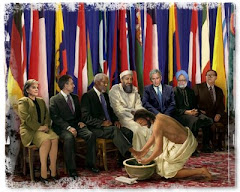good friend of mine sent this to me today. i thought it articulated a faithful biblical view of women. it is a statement of the direction a certain coc is taking. i happen to agree 100%. it is worth the read, and thought......
Men and women have both played vital roles in the life and ministry of the Stamford Church of Christ since its founding in 1966. Now after years of study, prayer, and reflection, it is the teaching position of the Stamford Church of Christ that in Christ Jesus there is neither male nor female (Gal. 3:28). We understand this to mean that distinctions of roles, privileges, rights, and status on the basis of birth (that is, on the basis of race, gender, and class) are ended in Christ. We base this conclusion on a careful and exhaustive study of Scripture.
Paul when he writes the texts that have traditionally been central to our understanding of gender roles in the church—1 Corinthians 11:1-16; 1 Corinthians 14:33-35; and 1 Timothy 2:9-15—is writing under the shadow of Rome. He is giving practical and spiritual leadership to a small persecuted minority with no realistic, loving way to affect the cultural patterns enforced by an all-powerful Roman aristocracy. He himself is in and out of prison. Other church leaders-pillars like James, the Lord’s brother, and Peter-are being killed. The Roman establishment is suspicious of this new Christian faith. Christian notions of freedom and equality are undermining traditional Roman values.
Paul consequently is urging followers of Christ to live in such a way as to eliminate any barriers to the hearing and acceptance of the gospel. Classical thought followed in the footsteps of Aristotle. It viewed women as imperfect versions of men. And it argued that authority and subordination are inevitable and always necessary and, moreover, the physically stronger party is always superior. As a result society was intensely patriarchal and (from our standpoint) sexist. The typical Roman father was a paterfamilias; he had life-and-death authority over his wife, children, extended family, and household slaves. Paul then is calling his readers to live as disciples of Christ within the leadership patterns of his day. He is guiding Christians in the setting in which they live; he is not making their setting valid and mandatory for all time.
When Paul asks Christian women in Corinth to remain silent and submissive in church (1 Corinthians 14:33-35), he is asking them to conform to the standards of decency of that time and place. He is echoing all the finest Roman moralists; in that time a respectable woman did not speak in public. A woman speaking in public was immodestly exposing herself. Paul is writing exactly what was needed to keep the church respectable then and there. He is asking Christian women in Corinth to accommodate to contemporary standards of decency. They may pray or prophesy in their gatherings (1 Corinthians 11:5), but they must quit disrupting worship by asking questions out loud, the kinds of questions only the uneducated would ask. The immediate context is women asking questions. The broader context is Paul’s concern with the impressions church gatherings leave on outsiders (1 Corinthians 14:23). His overriding concern—and this is very typical of him—is that Christians not do what is disgraceful in their own cultures (1 Corinthians 9:19-23; Romans 12:17-18; Titus 2:3-10).
Paul’s instructions to Timothy at Ephesus (1 Timothy 2:9-15) arise out of the same concerns. But they also take into account a specific heresy plaguing the Ephesian church, one involving myths and endless genealogies (1 Timothy 1:3-7) and one in which women are heavily involved and by which they have been deceived (1 Timothy 4:7; 5:13-15; 2 Timothy 3:6-7). This heresy appears to be an early form of Jewish gnosticism (gnosis was the Greek word for knowledge, and gnostics were those spiritual elitists-“know-it-alls”-who claimed to have special knowledge). The religious climate in Ephesus focused on Artemis as the Mother Goddess and encouraged notions of female primacy and superiority. This was the region that gave birth to the legends of the female-warrior Amazons; over the next several centuries this feminizing tendency would also give rise in this same region to the cult of the Virgin Mary.
In response, Paul insists that women in the church at Ephesus are not to teach or have authority over men. The word translated “have authority over” in 1 Timothy 2:12 is used only here in the New Testament; a more common word for authority is used on all other occasions. But Paul needs a stronger word here. So the likely meaning is “to domineer.” Paul’s primary concern may be that uneducated women should not teach in domineering ways (often when two Greek verbs are joined as “teach” and “domineer” are here, the second qualifies the first). In any case Paul is denying that the feminine created the masculine which was a common notion in that time and place. He reminds his readers that Adam was formed first and that, far from the woman possessing special knowledge, it was she who was deceived. Paul then is not anchoring female subordination in creation; instead he is insisting that the creation story offers no room for female primacy or superiority.
Our understanding of the first-century Ephesian and Corinthian contexts continues to deepen and mature, but the pattern now is quite clear. Consequently it is our conclusion that those passages that restrict women’s participation in public worship (1 Corinthians 14:33-35; 1 Timothy 2:9-15) address specific circumstances in the particular cultural context of their original first-century audiences. We take care to distinguish between what the New Testament says about the new life in Christ and the degree of implementation possible in the first-century church. Just as we would no longer use the teaching “Slaves, obey your earthly masters” (Ephesians 6:5-9; Colossians 3:22-4:1; Titus 2:9-10) to defend slavery, we will no longer use 1 Corinthians 14:33-35 or 1 Timothy 2:9-15 to silence women’s voices in our assemblies together.
We believe that God has poured out his Spirit on all people, both men and women (Acts 2:17-21), and we call for an end to restricting the use of God-given gifts on the basis of gender. In doing this, we are confident that we are being fully and finally obedient to Jesus’ teachings on justice, mercy, peacemaking, mutual submission, freedom, “the last shall be first,” and self-sacrificial love. God’s way, expressed in Jesus’ life, teaching, death, and resurrection, is to empower others-to give power away so that everyone is freed to explore and develop their God-given giftedness. Restrictions on the basis of hierarchy, power, and status (e.g. Genesis 3:16) are at best an accommodation to a fallen world. In Christ Jesus there is neither Jew nor Greek, slave nor free, male nor female. We are all one.
This subject of women’s roles in our gatherings is under discussion and study in many Churches of Christ today, and some have made changes on the basis of their study. Our task is to examine the Scriptures, understand their particular historical context, and then apply them to our own unique historical context in such a way that we fulfill-in our time and place-the original intent of the inspired authors. We do not believe that other Christians need to pattern themselves after us, but neither do we want to be the ones who exclude people from using their gifts when God does not. And we are deeply concerned for the lost (Matthew 9:9-13), those who today do not know their way in life but who turn to the church to find God, and find themselves to be more ethical and humane than the church. We have learned from Paul that it is our spiritual responsibility to make the teachings about God our Savior attractive (Titus 2:1-10)-yes, attractive, he says-so as to win as many as possible to Jesus as the way, the truth, and the life (1 Corinthians 9:19-23). All this is essential to keeping our focus and the focus of honest seekers on the life, death, and resurrection of Jesus. The light that must always be kept shining is this gospel that has the power to save, heal, transform, and rescue our lives.
Wednesday, March 5, 2008
Subscribe to:
Post Comments (Atom)



2 comments:
While I can fully agree on the time and place cultural understanding on the passages in I Corinthians... the one that gives me pause is I Timothy where basis of his command is rooted not in culture or circumstance, but in creation. I find it difficult to dismiss this passage as only cultural since creation is at the heart of his reason for giving it. That transcends culture, doesn't it? Whether the word means teach in a domineering way or not, it still means something.
I say this from a perspective of full agreement on more visibility and participation by the women in our assemblies. I'm just struggling with what that looks like and where and if there are limits based on I Timothy.
Thanks for the post.
the post addresses this with the following "Paul’s primary concern may be that uneducated women should not teach in domineering ways (often when two Greek verbs are joined as “teach” and “domineer” are here, the second qualifies the first). In any case Paul is denying that the feminine created the masculine which was a common notion in that time and place. He reminds his readers that Adam was formed first and that, far from the woman possessing special knowledge, it was she who was deceived. Paul then is not anchoring female subordination in creation; instead he is insisting that the creation story offers no room for female primacy or superiority."
that is why paul calls on creation.
Post a Comment